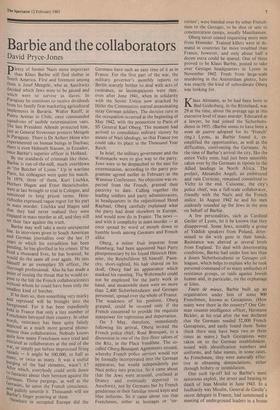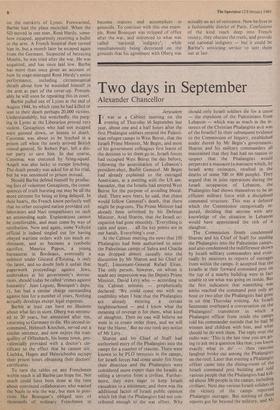Barbie and the collaborators
David Pryce-Jones
plenty of former Nazis more important than Klaus Barbie still find shelter in South America. First and foremost among them is Josef Mengele, who at Auschwitz decided which Jews were to be gassed and which were to survive as slaves. In Paraguay he continues to receive dividends from his family firm marketing agricultural Implements in Bavaria. Walter Rauff, at Punta Arenas in Chile, once commanded squadrons of mobile extermination vans. The late President Allende protected him, Just as General Stroessner protects Mengele In Paraguay. There is Dr Aribert Heim who experimented on human beings in Dachau; there is even Helmuth Stassen, in Ecuador, once Barbie's superior officer in Holland.
By the standards of criminals like these, Barbie is run-of-the-mill, much overblown as 'the Butcher of Lyons.' Up in wartime Paris, his colleagues were quite his match. In 1979, three of them, Kurt Lischka, Herbert Hagen and Ernst Heinrichsohn. were at last brought to trial in Cologne, and sentenced to long prison terms. Hein- richsohn expressed,vague regret for his part In mass murder. Lischka and Hagen said that they had never realised they were engaged in mass murder at all, and they still set their face against the truth. Barbie may well take a more unexpected line. In interviews given to South American and German journalists over the last 15 Years in which his extradition has been Pending, he has glorified in his crimes. If he lived a thousand lives, he has boasted, he would do the same all over again. He sees himself as an exemplary SS officer, the thorough professional. Also he has made a Point of issuing the threat that he would ex- pose to the hilt the French collaborationists without whom he could have been only the smallest kind of butcher.
If he does so, then something very murky and repressed will be brought into the foreground. For it has been expediently held in France that only a tiny number of Frenchmen betrayed their country. In other words, resistance has been quite falsely depicted as a much more general pheno- menon than collaboration. Nobody knows quite how many Frenchmen were tried and executed as collaborators at the end of the war, or simply put before improvised firing squads — it might be 100,000, or half as many, or twice as many. It was a useful Purging of the bad elements, wasn't it?
to fantasies which, everybody could settle down fantasies about their heroism against the Germans. Those purgings, as well as the fantasies, lie upon the French conscience, guiltily unsettle it. Thousands will see Barbie's finger pointing at them.
Nowhere in occupied Europe did the Germans have such an easy time of it as in France. For the first part of the war, the military governor's monthly reports to Berlin scarcely bother to deal with acts of resistance, so inconspicuous were they, even after June 1941, when in solidarity with the Soviet Union now attacked by Hitler the Communists started assassinating stray German soldiers. The decisive turn in the occupation occurred at the beginning of May 1942, with the promotion to Paris of SS General Karl Oberg. The moment had arrived to consolidate military victory by means of Nazi ideology, so that France too could take its place in the Thousand Year Reich.
In brief, the military government and the Wehrmacht were to give way to the party. Jews were to be despatched to the east for extermination, according to the party pro- gramme agreed earlier in February at the Wannsee Conference. No objection was ex- pected from the French, granted their passivity to date. Calling together the leading soldiers and party administrators, in headquarters in the requisitioned Hotel Raphael, Oberg carefully explained what the party had done elsewhere in Europe, and would now do in France. The news and with it complicity in mass murder — at once spread by word of mouth down to humble levels among Germans and French alike.
Oberg, a minor fruit importer from Hamburg, had been appointed Nazi Party plenipotentiary by his friend Heinrich Him- mler, the Reichsfuhrer SS himself. Paun- chy, short-sighted, his hair shaved on his skull, Oberg had an appearance which masked his cunning. The Wehrmacht could not be employed for the party work in hand, and meanwhile there were no more than 2,400 Sicherheitsdienst and Gestapo personnel, spread over the whole of France. The weakness of his position, Oberg grasped, could be covered only if the French consented to provide the requisite manpower for repression and deportation.
On 5 May, therefore, immediately following his arrival, Oberg invited the French police chief, Rene Bousquet, to a discussion in one of the first-floor salons of the Ritz, in the Place Vendome. The so- called Oberg-Bousquet Agreements ensued, whereby French police services would not be formally incorporated into the German apparatus, but would independently put Nazi policy into practice. So it came about that the Jews were arrested, confined at Drancy and eventually deported to Auschwitz, not by Germans but by French gendarmes in their familiar round kepis and blue iniforms. So it came about too that Frenchmen, either as hostages or 'ter-
rorists', were handed over by other French- men to the Gestapo, to be shot or sent to concentration camps, usually Mauthausen.
Oberg never ceased requesting more men from Himmler. Trained killers were in de- mand in countries far more troubled than France, however, and only about half a dozen extra could be spared. One of these proved to be Klaus Barbie, posted to take over Gestapo headquarters in Lyons in November 1942. Fresh from large-scale murdering in the Amsterdam ghetto, here was exactly the kind of subordinate Oberg was looking for.
Klaus Altmann, as he had been born in Bad Godesburg, in the Rhineland, was 29 at the time, about the average age at this executive level of mass murder. Educated as a lawyer, he had joined the Sicherheits- dienst in 1935. (Barbie seems to have been a nom de guerre adopted for its 'French' ring.) Lyons, as Barbie found it, ex- emplified the opportunities, as well as the difficulties, confronting the Germans. At the time of Barbie's arrival the city, like the entire Vichy zone, had just been smoothly taken over by the Germans in riposte to the Allied landings in North Africa. The prefect, Alexandre Angela, an embittered and vain Corsican, remained committed to Vichy to the end. Cussonac, the city's police chief, was a full-scale collaborator, friendly with the Nazis and the French milice. In August 1942 he and his men zealously rounded up the Jews in the area on behalf of Barbie.
A few personalities, such as Cardinal Gerlier of Lyons, let it be known that they disapproved. Some Jews, notably a group of Yiddish speakers from Poland, deter- mined to die with guns in their hands. Resistance was abetted at several levels from England. To deal with deteriorating conditions, Barbie had under him less than a dozen Sicherheitsdienst or Gestapo col- leagues, which helps to explain why he took personal command of so many ambushes of resistance groups, or raids against Jewish homes and, in particular, on the orphanage at Men.
Faute de mieux, Barbie built up an organisation under him of some 900 Frenchmen, known as Gestapistes. (How many were there in the country? One Ger- man counter-intelligence officer, Hermann Bickler, at his trial after the war declared that the Germans needed 32,000 French Gestapistes, and easily found them. Some think there may have been two or three times as many.) Such Gestapistes were taken on to the German establishment, issued with identification numbers and uniforms, and false names, in some cases. As Frenchmen, they were naturally effec- tive in obtaining denunciations, either through bribery or intimidation.
One such tip-off led to Barbie's most notorious exploit, the arrest and beating to death of Jean Moulin in June 1943. In a foolhardy way Moulin, General de Gaulle's secret delegate in France, had summoned a meeting of underground leaders in a house
on the outskirts of Lyons. Forewarned, Barbie had the place encircled. When the SD moved in one man, Rene Hardy, some- how escaped, apparently receiving a bullet in the arm. A French hospital then turned him in, but a month later he escaped again from the Germans. Suspected of betraying Moulin, he was tried after the war. He was acquitted, and has since laid low. Barbie has more than once given an account of how he stage-managed Rene Hardy's entire performance, including circumstantial details about how he wounded himself in the arm as part of the cover-up. Presum- ably he will soon be repeating this in court.
Barbie pulled out of Lyons at the end of August 1944, by which time he had killed or sent to their death perhaps 20,000 victims. Understandably, but wretchedly, the purg- ing in Lyons at the Liberation proved very violent. Gestapistes who had not escaped were gunned down, or beaten to death. Cussonac was about to be lynched in a prison cell when the newly arrived British consul-general, Sir Robert Parr, left a din- ner party to save him. In due course, Cussonac was executed by firing-squad. Angeli was also lucky to escape lynching. The death penalty was asked for at his trial, but he was sentenced to prison instead.
Should Barbie defend himself by produc- ing lists of volunteer Gestapistes, the conse- quences of truth bursting out may be all the more extreme for being so long delayed. In their-hearts, the French know perfectly well that no other occupied nation provided col- laborators and Nazi sympathisers on such an astounding scale. Explanations cannot be comfortable, and must come by way of retribution. Now and again, some Vichyite official is indeed singled out for having obeyed wartime orders with too much en- thusiasm, and so becomes a symbolic sacrifice. Maurice Papon, a young bureaucrat in Bordeaux, eventually a minister under Giscard d'Estaing, is only the latest, and no doubt feels it unfair that paperwork proceedings against Jews, undertaken at his government's instruc- tions, should today be called 'crimes against humanity'. Jean Leguay, Bousquet's depu- ty, has had a similar charge outstanding against him for a number of years. Nothing actually develops except legal expenses.
Barbie at least can have no illusions about what lies in store. Oberg was sentenc- ed to 20 years, but amnestied after ten, returning to Germany to die. His second-in- command, Helmuth Knochen, served out a similar sentence, and now enjoys the tran- quillity of Offenbach, his home town, pro- videntially provided with a doctor's cer- tificate to the effect that he cannot stir. Lischka, Hagen and Heinrichsohn occupy their prison hours obtaining their doctors' certificates.
To turn the tables on any Frenchmen within reach is all Barbie can hope for. Not much could have been done at the time about convinced collaborators who wanted the Nazis to win the war, but men in posi- tions like Bousquet's obliged tens of thousands of ordinary Frenchmen to become traitors and accomplices in genocide. To continue with this one exam- ple, Rene Bousquet was stripped of office after the war, and sentenced to what was called 'national indignity', while simultaneously being decorated on the grounds that his agreement with Oberg was actually an act of resistance. Now he lives in a fashionable district of Paris. Confusions of the kind reach deep into French society, they obscure the truth, and provide real national indignity — but it could be Barbie's unwitting service to sort them out at last.







































 Previous page
Previous page